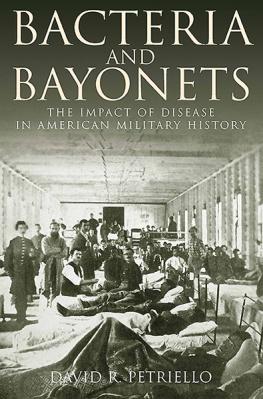Library of Congress Cataloging-in-Publication Data
Names: DArcangelis, Gwen Shuni, author.
Title: Bio-imperialism : disease, terror, and the construction of national fragility / Gwen Shuni DArcangelis.
Description: New Brunswick : Rutgers University Press, [2020] | Includes bibliographical references and index.
Identifiers: LCCN 2020009740 | ISBN 9781978814783 (paperback) | ISBN 9781978814790 (hardcover) | ISBN 9781978814806 (mobi) | ISBN 9781978814813 (pdf) | ISBN 9781978815162 (epub)
Subjects: LCSH: BioterrorismUnited States. | National securityUnited States. | Biological warfareUnited States. | RacismPolitical aspectsUnited States. | United StatesForeign relations.
Classification: LCC HV6433.35 .D38 2020 | DDC 363.325/30973dc23
LC record available at https://lccn.loc.gov/2020009740
A British Cataloging-in-Publication record for this book is available from the British Library.
Copyright 2021 by Gwen Shuni DArcangelis
All rights reserved
No part of this book may be reproduced or utilized in any form or by any means, electronic or mechanical, or by any information storage and retrieval system, without written permission from the publisher. Please contact Rutgers University Press, 106 Somerset Street, New Brunswick, NJ 08901. The only exception to this prohibition is fair use as defined by U.S. copyright law.

The paper used in this publication meets the requirements of the American National Standard for Information SciencesPermanence of Paper for Printed Library Materials, ANSI Z39.48-1992.
www.rutgersuniversitypress.org
Manufactured in the United States of America
Not more than a month after the events of September 11, 2001, letters laced with deadly anthrax spores arrived at the offices of several news media outlets and two U.S. senators, causing five deaths and seventeen injuries. The anthrax attacks swiftly shifted into position as a central node of the burgeoning war on terror, elevating its focus on bioterrorism, that is, the intentional spread of disease via germ or biological weapons. The FBI launched a massive, broad-scale investigation to find the perpetrator, enlisting advisers from science, national security, and policy and scholarly bodies, and even investigative journalists.
Early speculation reflected dominant national security discourse: the perpetrator was thought to be Al Qaeda or Iraqthe usual suspects of the post-9 / 11 eraor possibly Russia, a remnant of earlier Cold War era antagonism. Former vice president Dick Cheney conjectured that Al Qaeda actually used to train people in how to deploy and use these kinds of substances [biological and chemical weapons] (The Anthrax Source 2001). Weapons inspector Dick Spertzel was quoted in a Wall Street Journal article, The Anthrax War, suggesting that there are people in Iraq who know how to do it (Wall Street Journal 2001b). There was little evidence for these theories.
It took the FBI only a few months to determine that the anthrax used was the potent Ames strain, which derived from a U.S. government biodefense lab (USAMRIID).
The investigations findings were consistent with bioterrorisms historical pattern in the United States as a phenomenon carried out almost exclusively by domestic sources, specifically, white men. The lack of scrutiny of white male violence was consonant with dominant ideas about white masculinity as sources of authority and protection, ideas particularly entrenched during the war on terror (Shepherd 2006).
As has been theorized by cultural studies scholars, discourseor ways of speaking about the worldconstrains and limits the way that knowledge is constructed. Cultural theorist Stuart Hall defines discourse as a group of statements which provide a language for talking abouti.e. a way of representinga particular kind of knowledge about a topic. When statements about a topic are made within a particular discourse, the discourse makes it possible to construct the topic in a certain way. It also limits the other ways in which the topic can be constructed (Hall 1992, 291). Dominant discourse marginalizes explanationsin this case the culpability of white masculinitythat do not fit its dictates.
Discourse is connected to power: knowledge production promotes some power arrangements over others. Again I cite Hall, who draws on social theorist Michel Foucault to explain the connection between thought and action, between language and practice: Discourse is about the production of knowledge through language. But it is itself produced by a practice: discursive practicethe practice of producing meaning. Since all social practices entail meaning, all practices have a discursive aspect. So discourse enters into and influences all social practices (Hall 1992, 291). Discourse, then, has material effects; it is in fact formative of the material. Failure to problematize white masculinity in the anthrax case supported existing arrangements keeping white men in powerin the high-level U.S. biodefense industry, and at the helm of the U.S. national security apparatus more generally.
Discourse surrounding the anthrax mailings not only marginalized the culpability of white masculinity; it also carefully bounded discussions about the vast research industry from which the anthrax came. The biodefense research apparatus spanned government, university, and industry labs, where bioscientists, mainly microbiologists, toil away on dangerous pathogensin the name of national security. Over the course of the nearly nine-year anthrax investigation, the mass news media brought attention to the industrys ongoing lab accidentsaccidental exposures, lab leakages, and unintentional shipments of live germs instead of dead ones. Media attention peaked in 2006, when several lab workers at Texas A&M University were exposed to and infected with Q fever and brucellosis, resulting in the labs temporary suspension of activities. In response, federal officials insisted that the gains for national security outweighed the costs; security pundits concentrated on better training for scientists to reduce accidents. Absent among the proposed solutions, however, was a deeper questioning of the merits of the industry itself: What purpose does an active U.S. biodefense program serve?
Bio-Imperialism seeks to unravel the discursive edifices of U.S. biodefense: assumptions about bioterrorism and U.S. vulnerability, about germs and technoscientific capabilities to control them. It examines, moreover, the constitutive role that gender and race, along with U.S. imperial ambitions, play in U.S. bioterror and disease response.
PostCold War National Security Discourse: Race, Gender, Terror










 The paper used in this publication meets the requirements of the American National Standard for Information SciencesPermanence of Paper for Printed Library Materials, ANSI Z39.48-1992.
The paper used in this publication meets the requirements of the American National Standard for Information SciencesPermanence of Paper for Printed Library Materials, ANSI Z39.48-1992.